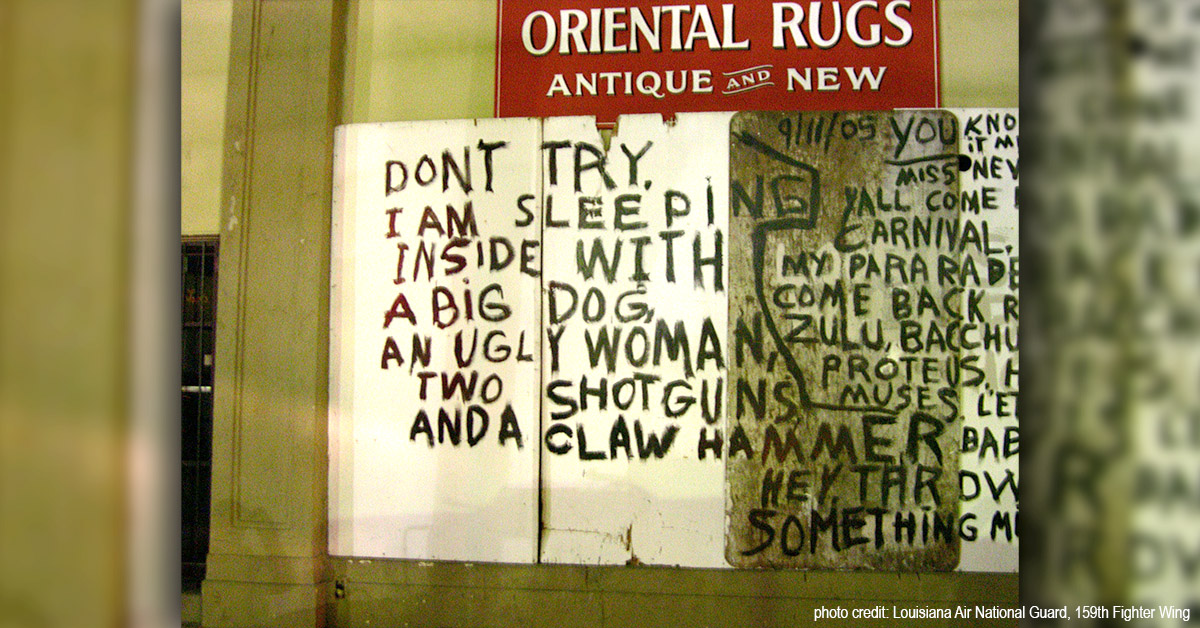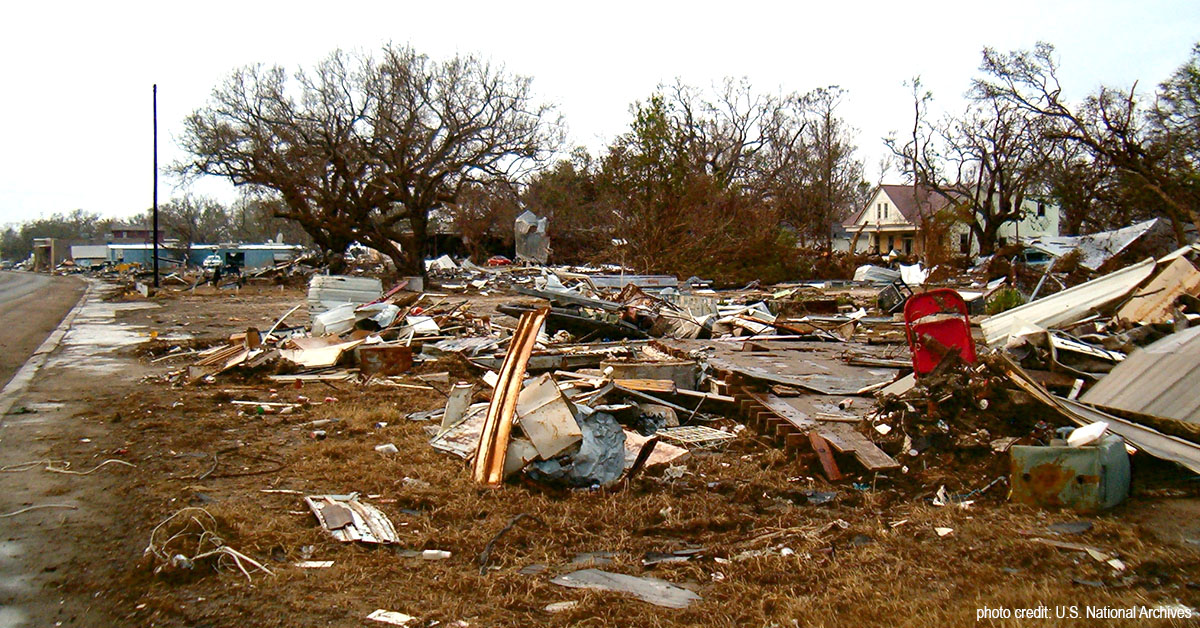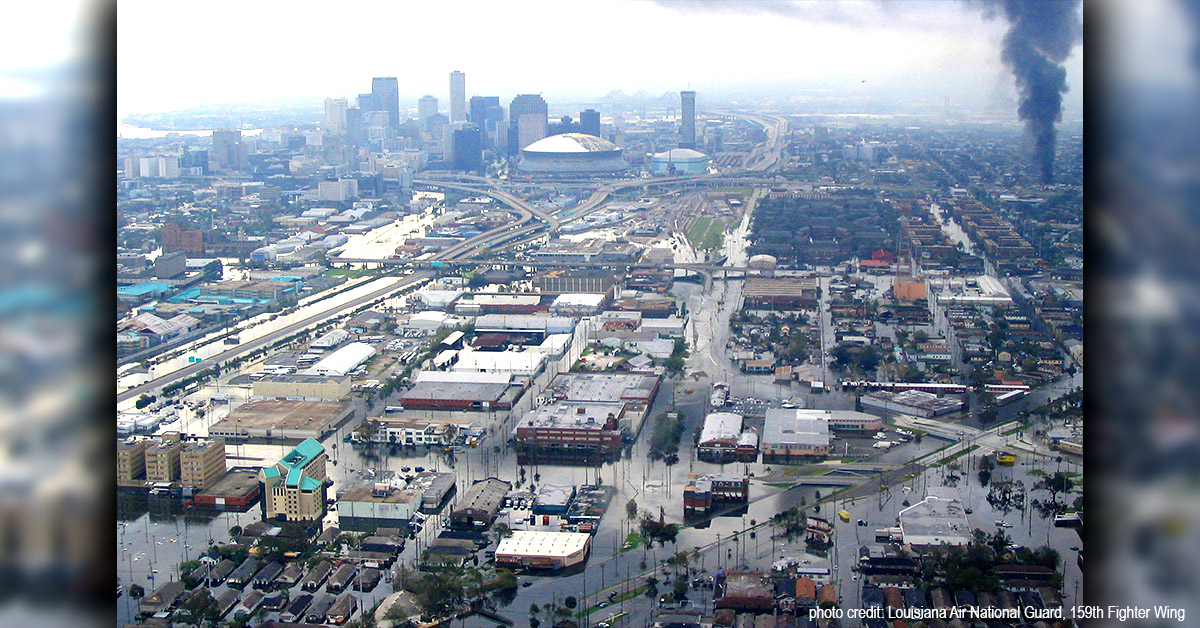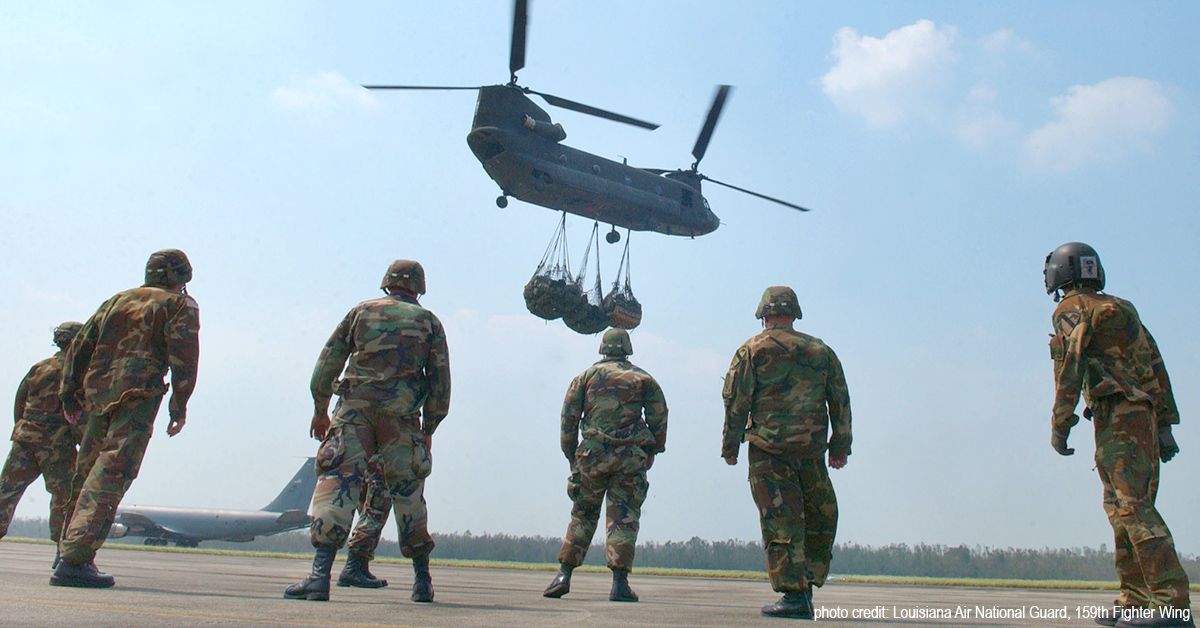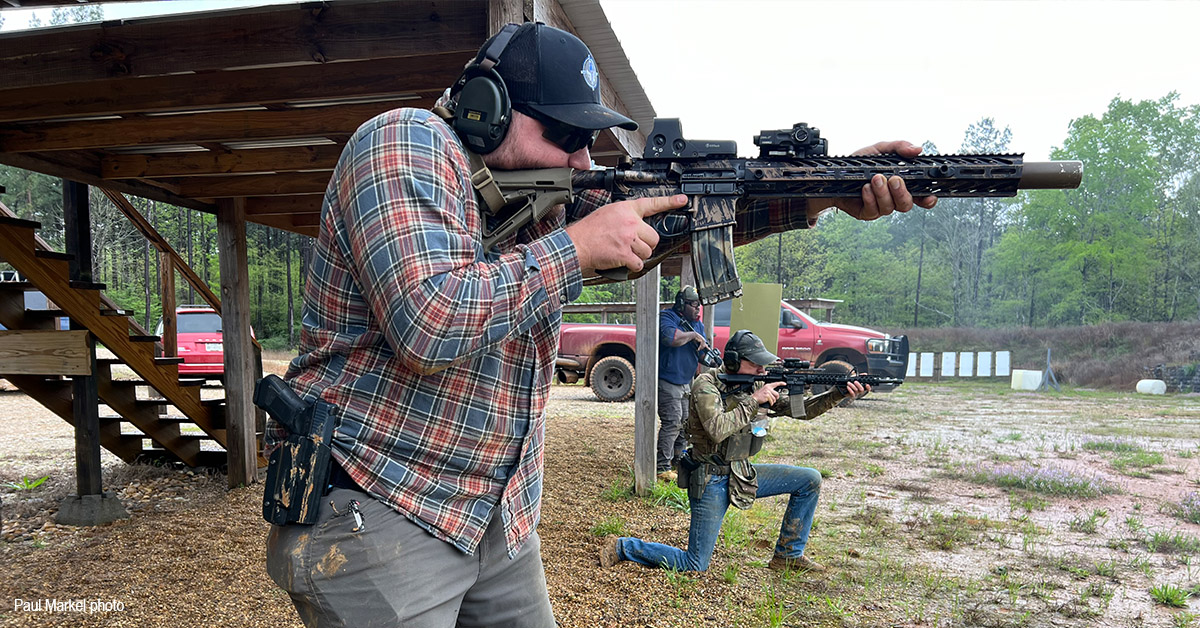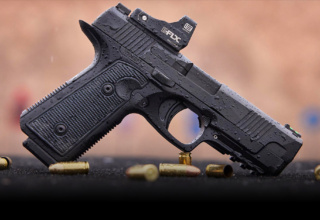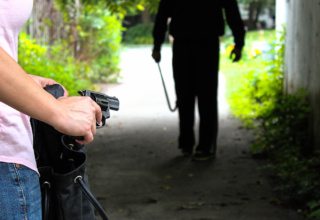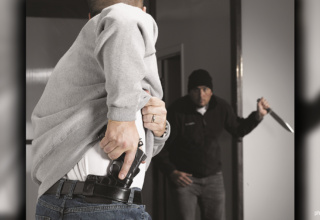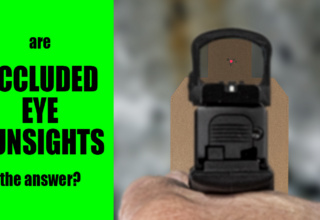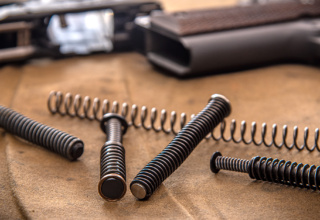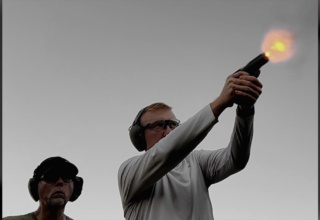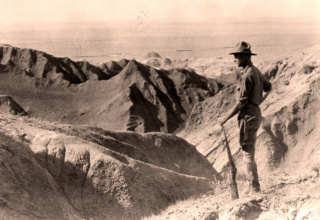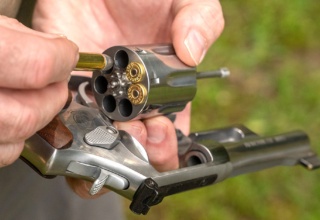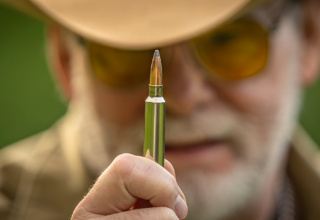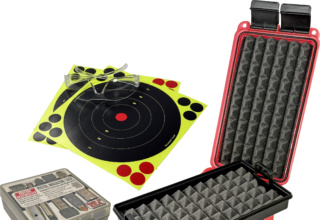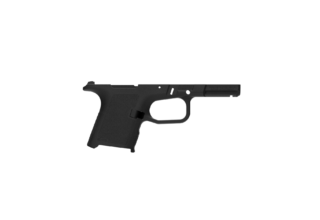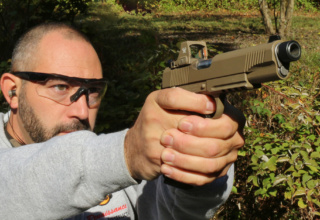Epic disasters put a fine point on the fragility of society, civil order, and the true nature of man. Twenty years ago, Hurricane Katrina pulled the masks off the good, the bad, and the downright ugly. The question is, have we learned anything?
by Paul G Markel
This year marks the 20th anniversary of Hurricane Katrina, a massive and monstrous storm the likes of which, fortunately, only materialize on average every thirty years or so. During the last two decades, the United States has experienced numerous natural disasters as well as manmade disasters, such as the Covid Crisis. Have we all learned our lessons?
It seems that every four to five years we experience a major disaster of some sort where the “experts” come out and start talking about having “three days of supplies.” Despite that constantly regurgitated advice, in the aftermath of a disaster, we are treated to stories of people “starving” during the first few days. After the flooding from Hurricane Helene, we listened to news reports that people were “trapped at home and could not get out to go to the stores.” Should “going to the store” be your first reaction in the aftermath of a disaster or should we all be better prepared to take care of our families and our neighbors?
Additionally, as it has been twenty years, there are many in the audience who were rather young when Hurricane Katrina happened. I write these words as a person who was there and witnessed first-hand both the good and the bad.
Deployed in a Hurry
On the morning of August 29, 2005, I was living in Ohio and working as a police officer for a small municipal department as well as contracting with various executive security companies. From the safety of the Midwest, we saw the stories on the news, but the storm was just that, a news story, not something that affected our lives.
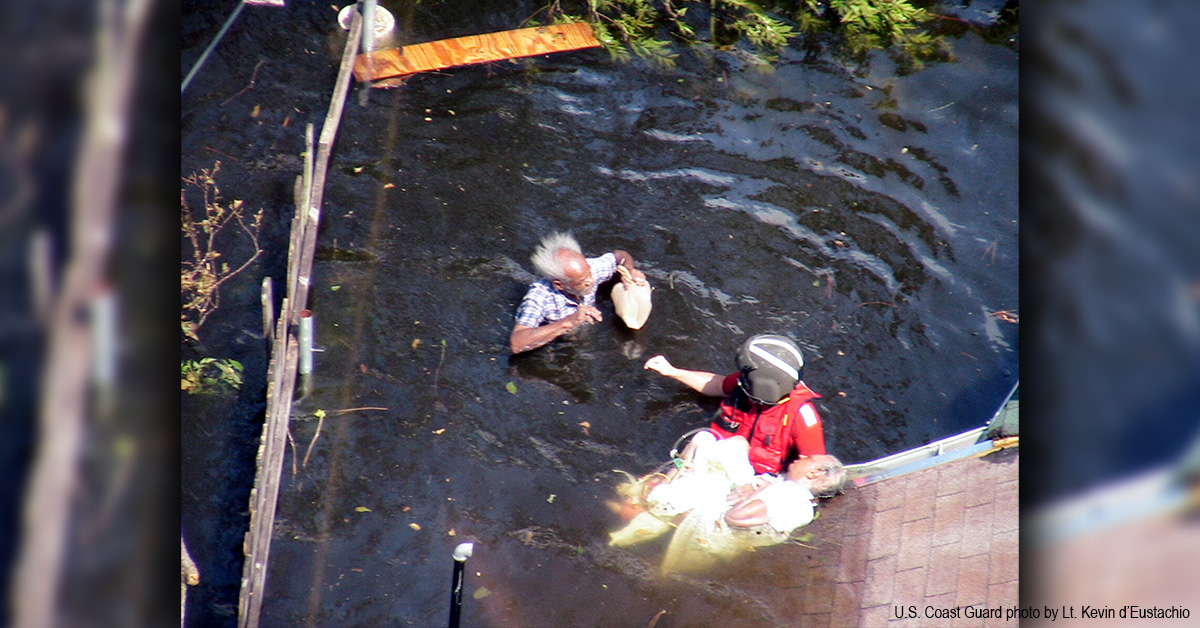
A couple days later, on September 1, the reports of the storm destruction and the breakdown of society were beginning to filter out of the Gulf Coast. Stories of looting, robbery, murder, and other lawlessness were gaining traction as eyewitness accounts became available. On that day, I opened my email and there was a message forwarded by a colleague telling me that Blackwater USA was looking for professionals to deploy to Louisiana immediately. I had trained at the Blackwater facility in Moyock, North Carolina, but had not yet contracted directly with them. The message stated that the company was specifically seeking certified peace officers in the United States to respond ASAP. Long story short, two days later I was on an airplane flying to Shreveport, Louisiana.
From Shreveport, I traveled with a half-dozen Blackwater contractors in the belly of a CASA C-212 cargo plane to a small field in Baton Rouge. Baton Rouge, Louisiana, was the primary staging area for security and relief workers going to and from New Orleans.
When I arrived in Baton Rouge, I was able to get my first glimpse of the reality of the situation. At the BellSouth (BellSouth was acquired by AT&T in 2006) headquarters, a tent city had been erected to shelter and feed company employees that had been displaced by the storm. Hundreds of people were sleeping on cots, sharing meals in a communal mess tent, and attempting to make sense of their situation.
Like thousands of other companies in Louisiana, Mississippi, and Alabama, Bellsouth had put a crisis management team together and they were taking care of their employees’ most basic needs: water, food, shelter, hygiene facilities, comfort items, and security. Security was something that these displaced families truly needed. They needed to know that they and their children would be safe from the lawless elements. This fact drove home to me almost immediately.
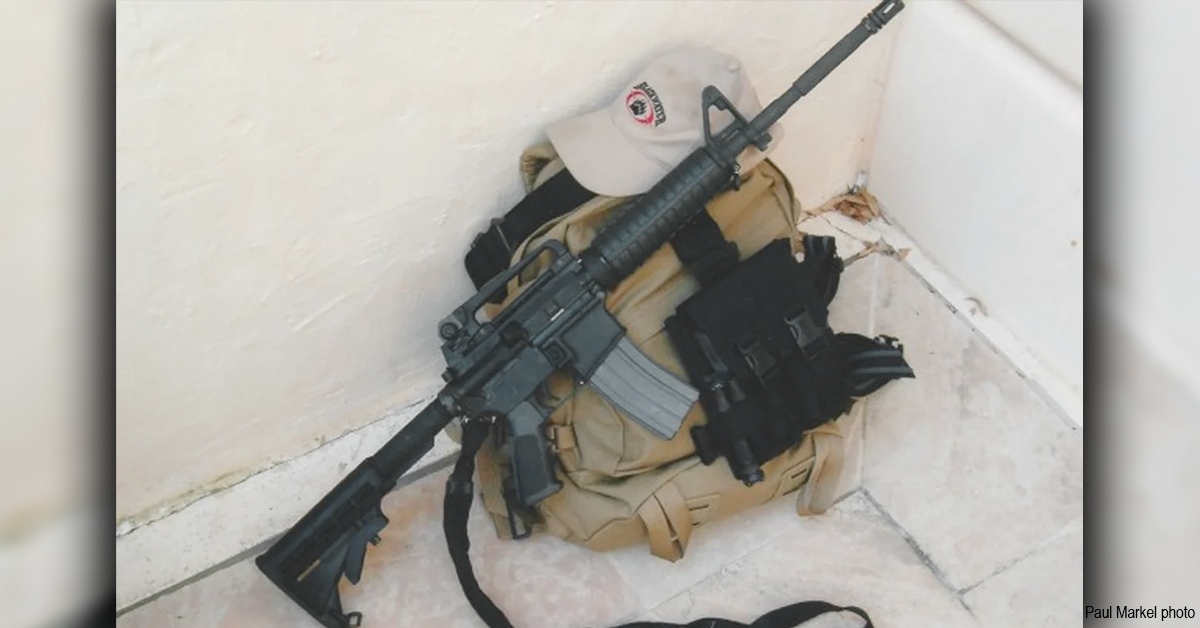
On my first morning in Baton Rouge, I was standing in line to eat breakfast at the mess tent behind a family with young children. A little boy, probably eight or nine years old, asked me if I was there to protect his family. I assured him that I was. Not quite placated, the boy asked, “What about at night, when we are sleeping, will you be awake?” I could see the genuine concern in his eyes. I assured the young man that I and many other men would be awake, 24 hours a day to keep his family safe.
BellSouth had contracted Blackwater to provide armed guards for their facility and to escort emergency workers back into the openly hostile, greater New Orleans area. Within 24 hours of the storm’s passage, emergency utility workers — electric, phone, water, cable, et cetera — attempted to enter the metroplex of New Orleans. Many of the workers were accosted by armed gangs and robbed. Bellsouth made the decision that every one of their emergency crews would need armed escorts.
My team did not stay long in Baton Rouge. After a day or so, we were sent to New Orleans to establish a command post for patrols, escorts, and property security. Upon entering the city, I was struck by the post-apocalyptic scene.
Every, and I mean every, liquor store, pharmacy, and pawn shop that we passed had been looted and then burned. We passed innumerable cars and trucks on the side of the road. Oddly, almost every vehicle had the hood up. One of my compatriots pointed and said, “They stole the batteries out of them.”
Despite the apologetic response from pundits a thousand miles away, the vermin were not taking food to “feed their families.” They stole prescription medication (primarily narcotic drugs), alcohol, guns, tennis shoes, TVs, and anything else not nailed down. Doctors and nurses were terrorized at gunpoint in the few hospitals that remained open while the vermin stole all the drugs they could get their hands on. A good percentage of N.O.P.D. officers had fled with their families; those that remained were greatly outnumbered.
The highways, streets, and roads in and around New Orleans were a labyrinth. Many of the exit/entrance ramps to the interstates were underwater. Some intersections were impassible due to vehicles and debris. Hundreds of trees and/or large limbs from trees littered the streets. Some storm damage had been cleared away as evidenced by the chain-saw dust on the roads. Many trees were too large to be removed by hand, and the streets were simply impassible. Navigation was hampered by the fact that many trees/limbs had fallen on street signs and taken them down.
The heat was stifling. As is the typical aftermath of a summer hurricane, the storm blew through and brought behind it tremendous heat and humidity with very little wind. Heat exhaustion for relief workers was a very real concern.
In addition to providing armed escorts to the BellSouth workers, our command post in Baton Rouge sent a list of addresses for us to find and inspect. Many residents had fled ahead of the storm and had no idea what shape their homes and businesses might be in. As we patrolled, we would attempt to locate the addresses given and determine their condition. Some were underwater, others looted and robbed, but many places we found were in good condition and untouched.
Good Guys and Bad Guys
In the dystopian aftermath of Hurricane Katrina, the City of New Orleans was plagued by roaming bands of thieves, rapists, and killers. For the first couple of days, the criminal element held sway over the city, operating with impunity both day and night. Their activities were evinced by burned-out buildings, automobile bodies riddled with bullet holes, and the occasional corpse that had yet to be removed by relief personnel.
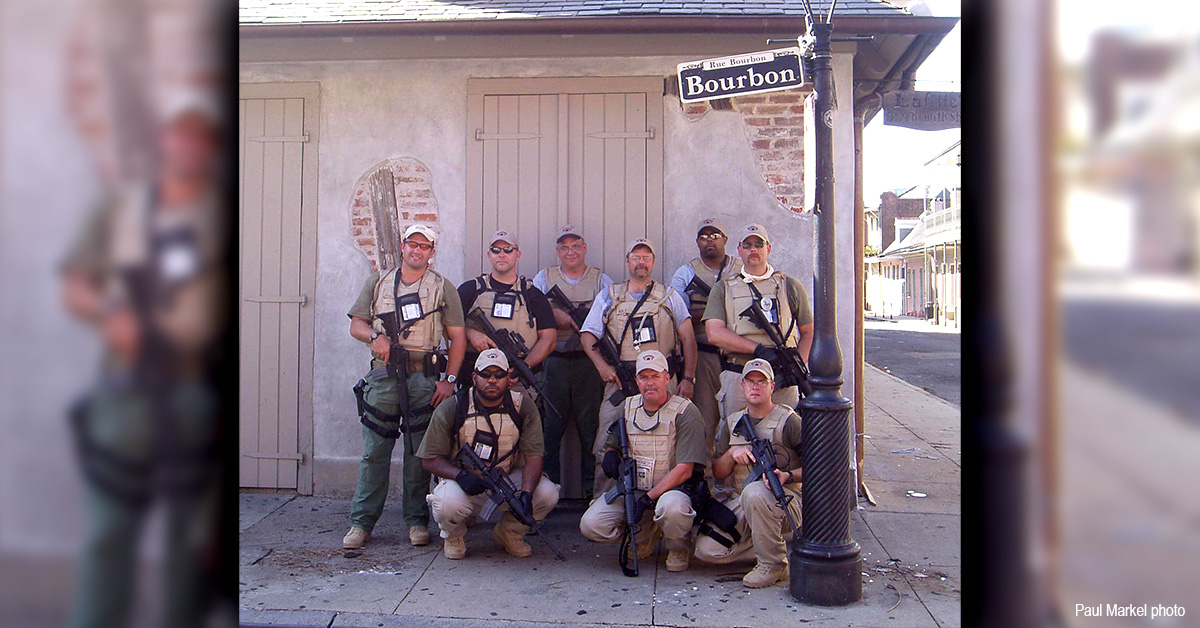
However, within 72 hours the tide began to turn. Good men with rifles began to converge on the greater New Orleans area from all points. The Louisiana Army National Guard took control of the Superdome and began to clean up that mess. Police officers from every surrounding state and many as far away as California converged on the “Big Easy” with black AR-15 rifles in their hands.
Almost overnight, the criminal vermin lost control of the city during the daylight and had to use the darkness to cloak their activities. The random daytime sniper fire from buildings throughout the city, which was a serious problem, was brought under control. The good citizens who had stayed behind could come out of their homes and begin the cleanup process.
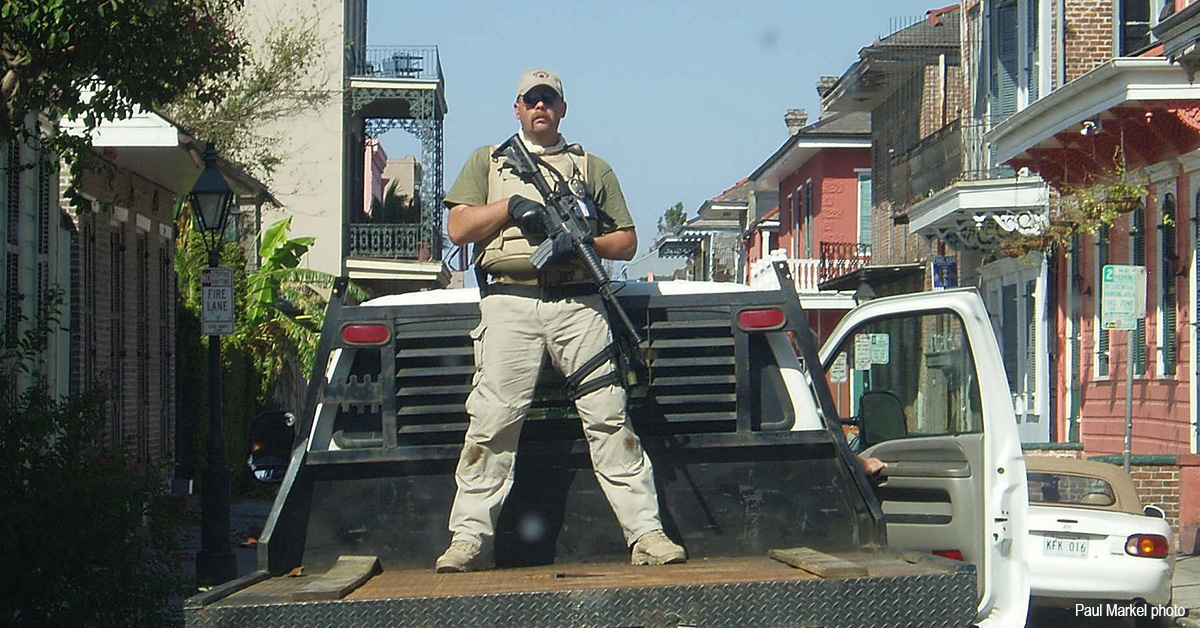
Despite what was reported in the mainstream media, the good people of New Orleans were not wary of the “feared mercenaries.” Quite the opposite. They embraced us…literally. At one of very few gas stations that had both electricity and fuel on hand, we encountered an older couple. The man and his wife were likely in their late sixties. As we stood around our Chevy Suburban clad in body armor with black rifles slung around our necks, the couple came up to thank us. The woman embraced us and kissed our cheeks. “Bless you, bless you for coming here,” she said. Her husband enthusiastically shook our hands. “Thank you, thank you for coming to save us,” he said with tears in his eyes. I will never forget the looks of relief and thanks on their faces. There was no fear or apprehension. These good people knew instinctively that we were on their side, and they had nothing to fear from us.
It was not just law enforcement and armed security who arrived. Relief workers from every agency in the United States flooded in with clean water, emergency food, and comfort items. Medical personnel of all forms — from EMTs and paramedics to nurses and doctors — arrived and set up aid stations throughout the city. Helicopters of every shape and fashion flew overhead — military, law enforcement, and privately owned.
What are the Lessons Learned?
Twenty years later, there is still some evidence of Katrina in the poor and depressed neighborhoods of New Orleans, such as the Lower 9th Ward. Many businesses took their insurance checks and left after their buildings were looted and destroyed by the roaming vermin. A story was just published in Louisiana noted that, after 20 years, there is still only one single grocery store open in the 9th Ward of New Orleans. Some storm damaged houses still stand as grim reminders. It was not until 19 years later, in 2024, that the abandoned Six Flags New Orleans amusement park was demolished.
The environmental disaster brought on by the hurricane was exacerbated by the lawless and shameful behavior of tens of thousands criminals and parasitic reprobates. Before the storm damage could be addressed, the vile and verminous had to be corralled.
Now, two decades after the “storm of the century,” we must ask ourselves, what were the lessons we learned? Just as appropriately, did we learn any lessons or are we simply doomed to repeat history?
You and I cannot affect change regarding New Orleans levies and how tax money is spent, save to attempt to remove corrupt politicians from office. Rather than focus on a political or government level, let us consider lessons learned from the standpoint of the citizen.
The most important take-away, at least from my perspective, was that any disaster, whether natural, man-made, or the combination of the two will bring out the very best and worst that society has to offer. Innumerable hours of television footage were dedicated to the looters and then to those who were portrayed as helpless victims.
What about the Good People?
Missing from most of the media coverage were the tens of thousands of good guys who dropped everything to travel to a distant place and lend aid to total strangers. It was not just big-name relief organizations like the American Red Cross, but thousands of individuals, church groups, men’s organizations, women’s auxiliaries…Americans who simply saw it as their duty to help their fellow citizens.
These volunteers had to be protected from the lawless vermin who used the breakdown in society to prey upon the good Samaritans. It is not enough to load a truck with food and water. If you expect those supplies to get to those in need, it must be protected by good men with guns. Wishes and good intentions will not shield you from the monsters.
Secondly, the government cannot be your hero. Time and time again, we have seen people look to a faceless government bureaucracy during times of tragedy as their savior. Not only does the government do a poor job, but the reality of the situation is also that the United States of America was not founded to become a nanny-state, where the government is charged with delivering the daily bread.
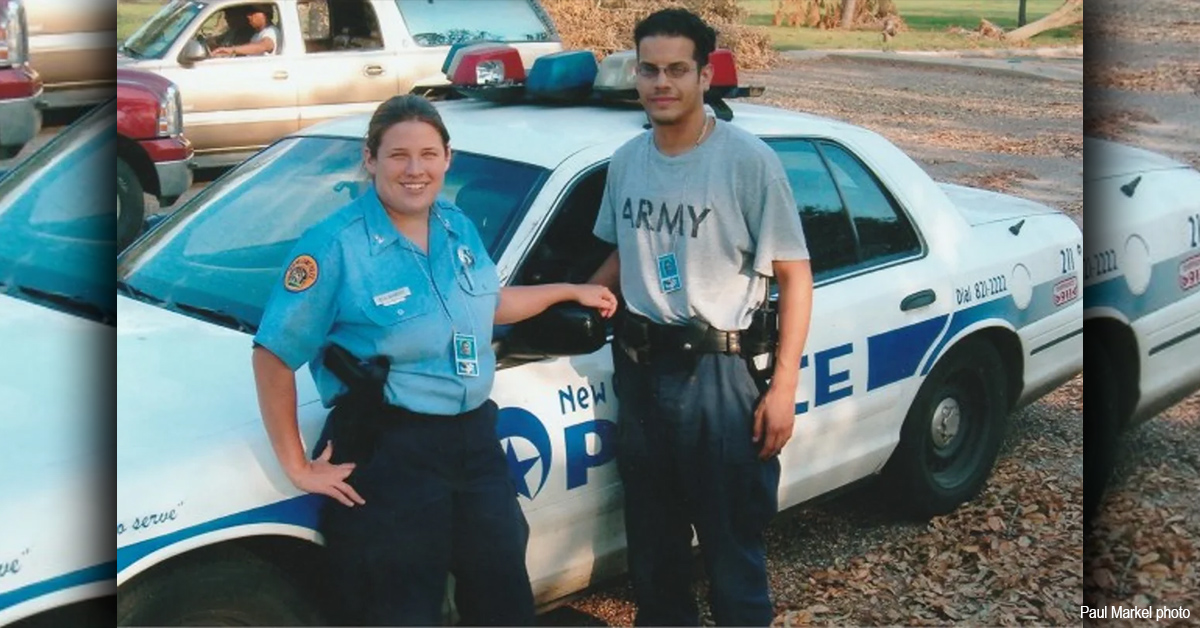
I spent ten years post-Katrina on the Mississippi Gulf Coast and can testify that the people of coastal Mississippi took the full strength of the storm. For literally miles and miles of Highway 90 there was not a single standing building within a half mile of the shoreline. Katrina came ashore in Pass Christian, MS, destroyed every building south of the railroad tracks, and carried the pieces out to sea. But the people of Mississippi got only scant media coverage, largely due to the fact that looters were shut down by the cops and armed citizens almost immediately. Also, the people of Mississippi went to work helping their neighbors rebuild.
Communities, and that breaks down to your churches and families, need to be the saviors, to be the blessing in times of need. We used to understand that in the USA, but we have become so weak and dependent that we have lost our way.
More Than Three Days
Although that standard advice is “have three days’ worth of food and water at home,” we can certainly do better. I’m going to say that, at any point, you should be able to go a full seven days without a trip to the grocery store. The three days advice reminds me of the USDA “recommended daily allowance” on food labels. If you dig in, you will realize that the RDA guidelines are for mere survival, not growth. The RDA of 50 grams of protein, for instance, is a sick joke. Adult humans who desire to be healthy and strong should be eating at least 150 grams a day minimum.
When it comes to post-disaster survival plans, you need to refer to Maslow’s Hierarchy of Needs. What do humans truly need for day-to-day living versus what do they want? You need clean water, food, shelter, security, restful sleep, and community. You do not need Netflix or candy dropping game apps on your phone.
Regarding food and water prep, think one gallon of water per person, per day and 2000 calories per person per day. Also, think of the quality of calories; 30 calories of protein are far more valuable than 30 calories of Twinkies. Single ingredient foods are nutritionally better for your body than processed foods.
Water is heavy and difficult to transport in bulk. Water purification systems are a good investment. Even after flooding, where there is water everywhere, most of it will not be drinkable. You don’t want to be trying to boil all the water you need to drink unless that is an absolute last resort. Boiling is time consuming and uses up valuable fuel.
Defending It All
While it might be uncomfortable to consider and come to grips with, the major lesson from Hurricane Katrina is that disasters bring out both the best and the worst that society has to offer. We witnessed completely selfless behavior from neighbors and volunteers, and we also witnessed savage, depraved, and murderous behavior. We hope for the former, but we must be prepared for the latter.
“Well, I have a gun, so I’ll be alright,” said more than one of you either in your head or aloud. You know what? The monsters who descend upon your neighborhood to take your food and water, kill you, and then rape your wives and daughters will have guns, too. So, what’s the difference?
The difference between armed good guys and armed monsters is not the presence of a gun. Nope, the difference should be your mindset, tactics, and skill. Their mindset is one of complete destruction and domination. Your mindset needs to be the determination that you will do anything to stop that from happening. AND, you need the tactics and the skill to back that up.
For my entire adult life, in one form or another, I have been devoted to teaching good people to defend themselves from evil. Please, do not think that ownership of a gun in and of itself will keep you safe. Your life and the lives of your family are worth far more of an investment than the cost of a gun. Student of the Gun University and Tactical Response stand ready to help you in your journey.
Until this world stops turning, there will be disasters and crises that must be dealt with. The question every man and woman must answer is this: are you prepared to be a blessing or a burden? Will your family, church, and community be ready to aid and protect each other or will you fall in line and beg Big Brother for your salvation? As these words are typed, you still have a choice.

